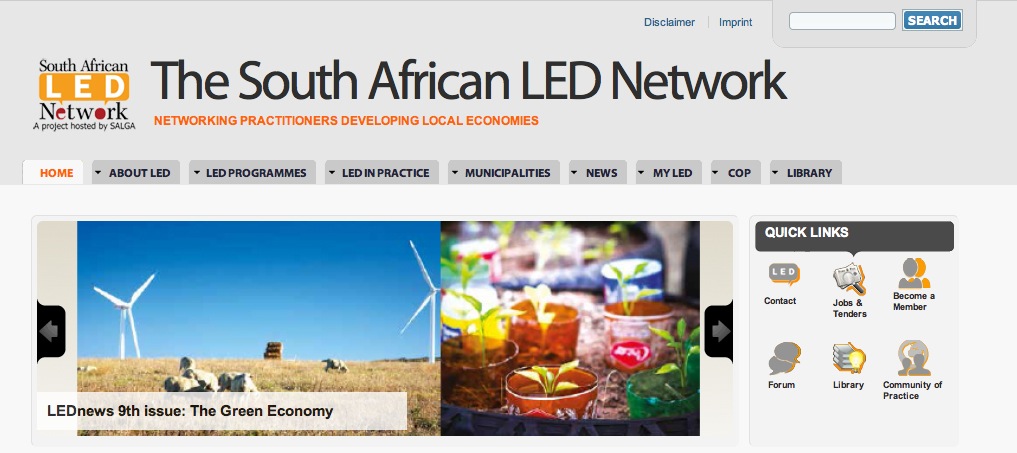Entrepreneurial Development in SA
The Impact of International Entrepreneurship Training on South African Entrepreneurs and Entrepreneurship Development
Teaching entrepreneurship, along with various forms of entrepreneurship education and training are subjects that those involved in enterprise development and entrepreneurial development believe are critical.

One South African organisation that shares information about entrepreneurship education is the South African LED (Local Economic Development) Network, a project that is hosted by SALGA (the South African Local Government Association).
The South African LED Network
The South African Association for Local Economic Development is dedicated to promoting good practice and dialogue locally, as well as connecting and enabling practitioners to network and so grow their businesses. The organisation also promotes discussion and exchange between LED practitioners in an endeavour to build a general body of knowledge in this country. That, of course is exactly what South African entrepreneurs and entrepreneurship development needs.
At the same time, LED in South Africa follows an international approach which South African entrepreneurs can learn from, and from which entrepreneurship can develop from. And at the end of the day, it encourages entrepreneurship education, helping to develop successful South African entrepreneurs.
In generic terms, LED is an ongoing process that allows key stakeholders and institutions from all spheres of life, as well as the public and private sector and civil society, to work together so they can create a unique advantage for everybody concerned. This means that these groups can more easily tackle market failures head on and do whatever is necessary to remove bureaucratic obstacles for local businesses. It is in this way that this initiative can strengthen the competitiveness of local firms.
The LED process also allows individuals, business and NGOs to build up “the economic capacity” of any local area so that it becomes possible to improve its economic future and basically improve the quality of life for everyone.
But hear it from some of the leaders in world entrepreneurship.
According to the World Bank, it is “a process by which public, business and non-governmental sector partners work collectively to create better conditions for economic growth and employment generation”.
The International Labour Organisation describes it as “a participatory process” that encourages social dialogue and public-private partnerships in a defined geographical area. This international organisation also states that LED (generically) enables local stakeholders to jointly design and implement a development strategy that is able to fully exploit local resources and capacities, and makes best use of the advantages of any particular area.
So there is no doubt that LED plays a huge role when it comes to South African entrepreneurs and entrepreneurship development.
Teaching Entrepreneurship Internationally
According to the South African LED network, most academic and development policy discussions concerning micro-entrepreneurs focus on credit constraints. That means that little businesses generally don’t have enough money to work with. They also assume that subject to these constraints, the entrepreneurs are able to manage their businesses in the best possible way – which is good.
But in reality, a huge problem is that people who are poor and self-employed poor very seldom have any formal training in business skills. With no money and no skills, it is pretty difficult to get anywhere at all.
With this in mind two researchers, Dean Karlan from Yale University and Martin Valdivia, used a random-control trial to measure the “marginal impact” of adding business training to a group of micro-entrepreneurs. The entrepreneurs – just like many South African entrepreneurs – were from Peru and were trying to improve the lives of people who were totally poverty stricken. More specifically, the Peruvian group were all women and then were involved in a lending programme for micro-entrepreneurs.
Karlan and Valdivia’s study is entitled Teaching Entrepreneurship: Impact of business training on micro-finance clients and institutions. It a valuable contribution in the field of entrepreneurship education and training and can be used by those people who are interested in South African entrepreneurs and entrepreneurship development.
Entrepreneurship Education and Training Materials Used
When people do studies, there are many approaches. For this one, Karlan and Valdivia used entrepreneurial training materials that were adapted from a US-based non-profit organisation called Freedom from Hunger.
Whilst not directly related to South African entrepreneurs and entrepreneurship development this international study does have a direct impact on entrepreneurship in South Africa, which is why the SA LED Network has published the report on their website.
Basically similar entrepreneurship training has been used worldwide by other organisations, including the International Labour Organisation mentioned earlier.
The goal of the programme is to teach entrepreneurial skills. But if the so-called entrepreneurial spirit is more about personality than skills, teaching somebody to engage in activities that are similar to those that a successful entrepreneur may engage in, may not in fact lead to improved business outcomes.
According to the study: “Training aims to improve basic business practices such as how to treat clients, how to use profits, where to sell, the use of special discounts, credit sales, and the goods and services produced. These improvements should lead to more sales, more workers, and could eventually provide incentives to join the formal sector.”
Without a doubt that is good news – and very helpful for South African entrepreneurs and entrepreneurship development.







